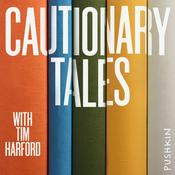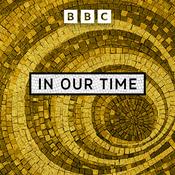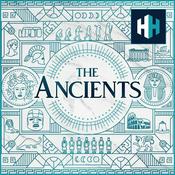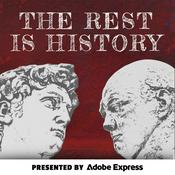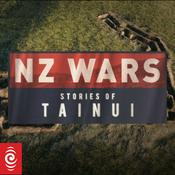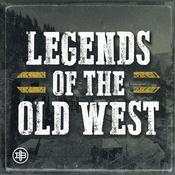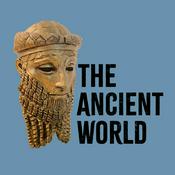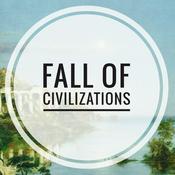22 episodes

The Southern Dynasties: An Interview with Professor Andrew Chittick
10/5/2025 | 46 mins.
Between 304 and 589 CE, China was divided into rivaling regimes occupying North and South China. While the north was controlled by a series of non-Han Chinese peoples, ultimately culminating in the Xianbei Northern Wei, the south was ruled by ruling houses of Han Chinese descent. In this companion episode to the interview ith Scott Pearce on the Northern Wei, Professor Andrew Chittick joins us to discuss the Southern Dynasties, from their development, to their society and culture, to their relationship with their northern neighbor, and finally to their legacy. Contributors: Andrew Chittick: Andrew Chittick is the E. Leslie Peter Professor of East Asian Humanities and History at Eckerd College, St. Petersburg, FL. His research focuses on the culture of early south China and maritime trade relations with Southeast Asia. He is the author of numerous articles and two full-length books: Patronage and Community in Medieval China: The Xiangyang Garrison, 400-600 CE (SUNY Press, 2010) and The Jiankang Empire in Chinese and World History (Oxford University Press, 2020). The latter book introduces a ground-breaking new perspective on the history and political identity of what is now south China in the early medieval period (3rd-6th centuries CE), including its evolving ethnic identity, innovative military and economic systems, and engagement with broader Sino-Southeast Asian and Buddhist cultures. Yiming Ha: Yiming Ha is the Rand Postdoctoral Fellow in Asian Studies at Pomona College. His current research is on military mobilization and state-building in China between the thirteenth and seventeenth centuries, focusing on how military institutions changed over time, how the state responded to these changes, the disconnect between the center and localities, and the broader implications that the military had on the state. His project highlights in particular the role of the Mongol Yuan in introducing an alternative form of military mobilization that radically transformed the Chinese state. He is also interested in military history, nomadic history, comparative Eurasian state-building, and the history of maritime interactions in early modern East Asia. He received his BA from UCLA, his MPhil from the Hong Kong University of Science and Technology, and his PhD from UCLA. He is also the book review editor for Ming Studies. Credits: Episode no. 22 Release date: May 9, 2025 Recording date: February 10, 2025 Recording location: St. Petersburg, FL/Los Angeles, CA Images: Stone pixiu 貔貅 (winged lion), from the tomb of Xiao Hui, a prince of Southern Liang (502-557), in Nanjing. (Image Source) Greatest extent of the Liang Dynasty, one of the southern dynasties. (Image Source) Liang Emperor Wu, who reigned the longest out of all the Southern Dynasty emperors, from 502 to 549. His reign saw the growing importance of Buddhism. (Image Source) A scroll of tributary emperors paying homage to the Liang emperor. The Southern Dynasties oversaw a prosperous commercial economy, with trading networks spanning East and Southeast Asia. Song copy of the original Liang painting. (Image Source) A Tang dynasty copy of Wang Xizhi's (303–361), Lantingji xu, one of the most famous pieces of calligraphy in Chinese history. The Southern Dynasties are known for their cultural production. (Image Source) Selected References: Chittick, Andrew. The Jiankang Empire in Chinese and World History. Oxford: Oxford University Press, 2020. Dien, Albert E. Six Dynasties Civilization. New Haven: Yale University Press, 2009. Dien, Albert E. and Keith N. Knapp, eds. The Cambridge History of China: Volume 2, The Six Dynasties, 220–589. Cambridge: Cambridge University Press, 2020. Graff, David A. Medieval Chinese Warfare, 300–900. London and New York: Routledge, 2002. Lewis, Mark Edward. China between Empires: The Northern and Southern Dynasties. Cambridge, MA: Harvard University Press, 2009.

More Swindles from the Late Ming - An Interview with the Translators
02/3/2025 | 42 mins.
More Swindles from the Late Ming is the companion piece to the Book of Swindles, a translation of a Late Ming text by Zhang Yingyu (fl. 1612–1617) which details various types of scams and swindles and how to guard against them. More Swindles from the Late Ming "presents sensational stories of scams that range from the ingenious to the absurd to the lurid, many featuring sorcery, sex, and extreme violence. Together, the two volumes represent the first complete translation into any language of a landmark Chinese anthology, making an essential contribution to the global literature of trickery and fraud." Bruce Rusk and Christopher Rea, the translators, joins us to talk about these two books and their experience with the translatino. More information on More Swindles from the Late Ming available on the publisher's website here. Contributors: Bruce Rusk Bruce Rusk is an Associate Professor of Pre-modern and Early Modern China in the Department of Asian Studies at the University of British Columbia. His main areas of research and teaching are the cultural history of China, especially the Ming (1368–1644) through mid-Qing (1644–1911) periods. Additionally, he also works on the history of textual studies, literary culture, writing systems, and connoisseurship. He has published widely and was the past present of the Society for Ming Studies. Christopher Rea Christopher Rea is a Professor of Modern Chinese Literature in the Department of Asian Studies at the University of British Columbia. His research focuses on the modern Chinese-speaking world and his recent publications concern research methodology, cinema, comedy, celebrities, swindlers, cultural entrepreneurs, and the scholar-writers Qian Zhongshu and Yang Jiang. He has published several books and numerous articles, and also hosts a free online course on Chinese novels. Yiming Ha Yiming Ha is the Rand Postdoctoral Fellow in Asian Studies at Pomona College. His current research is on military mobilization and state-building in China between the thirteenth and seventeenth centuries, focusing on how military institutions changed over time, how the state responded to these changes, the disconnect between the center and localities, and the broader implications that the military had on the state. His project highlights in particular the role of the Mongol Yuan in introducing an alternative form of military mobilization that radically transformed the Chinese state. He is also interested in military history, nomadic history, comparative Eurasian state-building, and the history of maritime interactions in early modern East Asia. He received his BA from UCLA, his MPhil from the Hong Kong University of Science and Technology, and his PhD from UCLA. He is also the book review editor for Ming Studies. Credits: Episode no. 21 Release date: March 1, 2025 Recording date: January 9, 2025 Recording location: Vancouver, Canada/Los Angeles, CA

The Northern Wei: An Interview with Professor Scott Pearce
25/1/2025 | 52 mins.
The Northern Wei was a nomadic conquest dynasty that existed in north China between 386 and 535 CE. It was founded by the Tuoba (Tabgach) clan of the Xianbei (Särpi) peoples, a nomadic-pastoralist people originating from the Mongolian steppes. The Northern Wei is particularly noted for unifying northern China in the first half of the fifth century, bringing an end to the chaotic Sixteen Kingdoms period that plagued China for almost a century. In addition to bringing relative peace to north China, the Northern Wei also saw the firm establishment of Buddhism. The culture, institutions, and practices of the Northern Wei would have a tremendous impact on China, for it was the precursor to two great Chinese dynasties - the Sui and the Tang. Professor Scott Pearce, an expert on the Northern Wei, joins us to talk about about this nomadic regime. Contributors Scott Pearce Scott Pearce is a Professor of History at Western Washington University, specializing in the intersection of Chinese and Inner Asian histories in the medieval period with a particular focus on dynasties of Inner Asian origin that ruled northern China during the 4th through the 6th centuries CE. He recently completed a volume on the Northern Wei, a nomadic regime founded by Xianbei peoples, which ruled northern China from 386 to 535 CE. Yiming Ha Yiming Ha is the Rand Postdoctoral Fellow in Asian Studies at Pomona College. His current research is on military mobilization and state-building in China between the thirteenth and seventeenth centuries, focusing on how military institutions changed over time, how the state responded to these changes, the disconnect between the center and localities, and the broader implications that the military had on the state. His project highlights in particular the role of the Mongol Yuan in introducing an alternative form of military mobilization that radically transformed the Chinese state. He is also interested in military history, nomadic history, comparative Eurasian state-building, and the history of maritime interactions in early modern East Asia. He received his BA from UCLA, his MPhil from the Hong Kong University of Science and Technology, and his PhD from UCLA. He is also the book review editor for Ming Studies. Credits: Episode no. 20 Release date: January 25, 2025 Recording date: December 10, 2024 Recording location: Bellingham, WA/Los Angeles, CA Images Terracotta soldiers in Northern Wei uniform, from the tomb of Sima Jinglong (Image Source) The Northern Wei, c. 500 CE (Image Source) Another map of the Northern Wei, with major settlements marked (Image Source) Figurines of Northern Wei court ladies (Image Source) Buddhist sculptures and murals from the Mogao caves, dated to the Northern Wei (Image Source) Select References: Beckwith, Christopher I. “On the Chinese Names for Tibet, Tabghatch and the Turks.” Archivum Eurasiae Medii Aevi 14 (2005): 7–22. Chen, Sanping. Multicultural China in the Early Middle Ages. Philadelphia: University of Pennsylvania Press, 2012. Pearce, Scott. Northern Wei (386-534): A New Form of Empire in East Asia. Oxford: Oxford University Press, 2023. Shimunek, Andrew. Languages of Ancient Southern Mongolia and North China: A HistoricalComparative Study of the Serbi or Xianbei Branch of the Serbi-Mongolic Language Family. Wiesbaden: Harrassowitz, 2017. Zhang, Fan. “Cultural Encounters: Ethnic Complexity and Material Expression in Fifthcentury Pingcheng, China.” PhD diss., New York University, 2018.

Professor Ronald Po on Qing China's 'Blue Frontier'
21/9/2024 | 46 mins.
The Qing, China's last imperial dynasty, ruled over one of the largest empires in Eurasia at the dawn of the 19th century. Throughout the preceding century, it expanded its reach into the northwest, southwest, Tibet, and gained hegemony over Mongolia. For a long time, traditional historiography has viewed the Qing as a land-based, agrarian power with minimal engagement with the seas. Even its successful conquest of Taiwan in 1683 was seen as a one-time affair. This, the traditional narrative goes, was the reason why the Qing lost to the British in the First Opium War. Scholars today have increasingly pushed back against this view, pointing out the Qing's liberalization of ocean-going trade and its development of a naval infrastructure. Joining me today is Ronald Po, author of Blue Frontier: Maritime Vision and Power in the Qing Empire, who will talk about Qing maritime history and policy in the 18th and 19th centuries. Contributors: Ronald Po Ronald Po is an Associate Professor in the Department of International History at LSE. He is a historian of late imperial China, with a focus on maritime history and global studies. His book, Blue Frontier: Maritime Vision and Power in the Qing Empire, seeks to revise the view of China in this period as an exclusively continental power with little interest in the sea. Instead, the book argues that the Qing deliberately engaged with the ocean politically, militarily, and conceptually, and responded flexibly to challenges and extensive interaction on all frontiers - both land and sea - in the eighteenth century. Professor Po joins us today to talk about his research on Qing maritime history. Yiming Ha Yiming Ha is the Rand Postdoctoral Fellow in Asian Studies at Pomona College. His current research is on military mobilization and state-building in China between the thirteenth and seventeenth centuries, focusing on how military institutions changed over time, how the state responded to these changes, the disconnect between the center and localities, and the broader implications that the military had on the state. His project highlights in particular the role of the Mongol Yuan in introducing an alternative form of military mobilization that radically transformed the Chinese state. He is also interested in military history, nomadic history, comparative Eurasian state-building, and the history of maritime interactions in early modern East Asia. He received his BA from UCLA, his MPhil from the Hong Kong University of Science and Technology, and his PhD from UCLA. He is also the book review editor for Ming Studies. Credits: Episode no. 19 Release date: September 21, 2024 Recording location: Amsterdam/Los Angeles, CA References courtesy of Ronald Po Images: The Port of Canton (Guangzhou) in c. 1830, showing the factories of the foreign powers (Image Source) View of Canton (Guangzhou) in c. 1665 with ships of the Dutch East India Company in the foreground (Image Source) Chinese junk in Guangzhou, c. 1823 (Image Source) The East India Company steamship Nemesis (right background) destroying war junks during the Second Battle of Chuenpi, 7 January 1841 (Image Source) Select References: Gang Zhao, The Qing Opening to the Ocean: Chinese Maritime Policies, 1684-1757 (Honolulu: University of Hawai’i Press, 2013). Hans van de Ven, Breaking with the Past The Maritime Customs Service and the Global Origins of Modernity in China (New York: Columbia University Press, 2014). John D. Wong, Global Trade in the Nineteenth Century: The House of Houqua and the Canton System (Cambridge: Cambridge University Press, 2016). John E. Wills, Jr., China and the Maritime Europe, 1500-1800: Trade, Settlement, Diplomacy, and Missions (Cambridge: Cambridge University Press, 2010). Leonard Blussé, Visible Cities Canton, Nagasaki, and Batavia and the Coming of the Americans (Cambridge, Mass.: Harvard University Press, 2008). Melissa Macauley, Distant Shores Colonial Encounters on China's Maritime Frontier (Princeton: Princeton University Press, 2021). Paul A. van Dyke, Whampoa and the Canton Trade Life and Death in a Chinese Port, 1700-1842 (Hong Kong: Hong Kong University Press, 2020). Schottenhammer, Angela, China and the Silk Roads (ca. 100 BCE to 1800 CE): Role and Content of Its Historical Access to the Outside World (Leiden: Brill, 2023). Tonio Andrade, The Gunpowder Age: China, Military Innovation, and the Rise of the West in World History (Princeton: Princeton University Press, 2017). Wensheng Wang, White Lotus Rebels and South China Pirates (Cambridge, Mass.: Harvard University Press, 2014). Xing Hang, Conflict and Commerce in Maritime East Asia The Zheng Family and the Shaping of the Modern World, c.1620-1720 (Cambridge: Cambridge University Press, 2015). Zheng Yangwen, China on the Sea: How the Maritime World Shaped Modern China (Leiden: Brill, 2011).

Cultural Production during the Ming-Qing Transition: A Conversation with Professor Lynn Struve
02/3/2024 | 56 mins.
The Ming-Qing transition was an extremely chaotic time in Chinese history. Millions died of warfare, pestilence, or starvation, and millions more were displaced. Yet despite all these issues, this was also a period of cultural production, which has often been overlooked as people focus on the wars, famine, and climate change that pervaded this period. In this episode, I speak with Professor Lynn Struve about the literary pursuits of men and women and the overall intellectual landscape in the Late Ming and the Early Qing Contributors Lynn Struve Lynn Struve is an emeritus professor of history and an emeritus professor of East Asian languages and cultures at Indiana University Bloomington. Her research interests include traditional Chinese history, 17th century political and intellectual history, East-West comparative thought, and Chinese reference and source materials. Over the course of her career, she has published widely, particularly on the period of the Ming-Qing transition, and has received numerous awards. Her representative works include Voices from the Ming-Qing Cataclysm: China in Tigers' Jaws, The Southern Ming, 1644-1662, The Ming-Qing Conflict: A Historiography and Source Guide, and, more recently, The Dreaming Mind and the End of the Ming World, which was recently awarded best overall book in Ming studies published between 2019 and 2022 by the Society for Ming Studies. Yiming Ha Yiming Ha is a Ph.D. candidate in the Department of History at the University of California, Los Angeles. His current research is on military mobilization and state-building in China between the thirteenth and seventeenth centuries, focusing on how military institutions changed over time, how the state responded to these changes, the disconnect between the center and localities, and the broader implications that the military had on the state. His project highlights in particular the role of the Mongol Yuan in introducing an alternative form of military mobilization that radically transformed the Chinese state. He is also interested in military history, nomadic history, comparative Eurasian state-building, and the history of maritime interactions in early modern East Asia. He received his BA from UCLA and his MPhil from the Hong Kong University of Science and Technology. Credits Episode no. 18 Release date: March 1, 2024 Recording location: Bloomington, IN/Los Angeles, CA References compiled by Yiming Ha Images A portrait of the Kangxi emperor as a scholar, painted in 1699 when he was forty-five years of age. (Image Source) An alternative portrait of the Kangxi emperor that Jonathan Spence used for his book on the Kangxi emperor. This portrait shows the pockmarks on his face, a result of his childhood survival of smallpox which devastated the Manchu population. (Image Source) A portrait of Huang Zongxi (1610-1695), one of the great scholars of the Late Ming and Early Qing. Originally a prominent figure in the Ming loyalist movement, Huang retired from Ming loyalism but also refused to serve the Qing. Nonetheless, Huang made many contributions to scholarship by indirectly accommodating the Qing. (Image Source) A late 18th/early 19th century portrait of Liu Rushi (1618-1664), one of the most famous courtesans of the 17th century and a prominent female scholar. (Image Source) Select References Brook, Timothy. The Price of Collapse: The Little Ice Age and the Fall of Ming China. Princeton: Princeton University Press, 2023. Ko, Dorothy. Teachers of the Inner Chambers: Women and Culture in Seventeenth-century China. Stanford University Press, 1994. Struve, Lynn. The Dreaming Mind and the End of the Ming World. Honolulu: University of Hawaii Press, 2019. Widmer, Ellen. The Beauty and the Book: Women and Fiction in Nineteenth-century China. Cambridge, MA: Harvard University Asia Center, 2006. Widmer, Ellen. The Inner Quarters and Beyond Women Writers from Ming Through Qing. Leiden: Brill, 2010.
More History podcasts
Trending History podcasts
About The Chinese History Podcast
Listen to The Chinese History Podcast, Cautionary Tales with Tim Harford and many other podcasts from around the world with the radio.net app
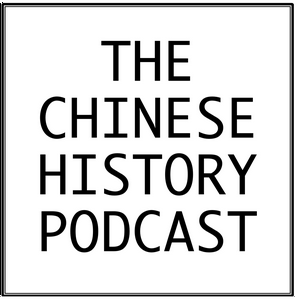
Get the free radio.net app
- Stations and podcasts to bookmark
- Stream via Wi-Fi or Bluetooth
- Supports Carplay & Android Auto
- Many other app features
Get the free radio.net app
- Stations and podcasts to bookmark
- Stream via Wi-Fi or Bluetooth
- Supports Carplay & Android Auto
- Many other app features


The Chinese History Podcast
download the app,
start listening.
